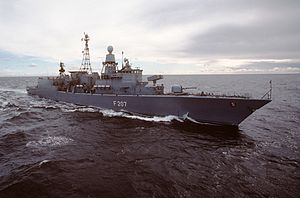 Bremen in 1986 Bremen in 1986
| |
| History | |
|---|---|
| Name | Bremen |
| Builder | Bremer Vulkan, Bremen |
| Laid down | 9 July 1979 |
| Launched | 27 September 1979 |
| Commissioned | 7 May 1982 |
| Decommissioned | 28 March 2014 |
| Identification |
|
| Fate | Scrapped, 2021 |
| General characteristics | |
| Class and type | Bremen-class frigate |
| Displacement | 3,680 tonnes (3,620 long tons) |
| Length | 130.50 m (428 ft 2 in) |
| Beam | 14.60 m (47 ft 11 in) |
| Draft | 6.30 m (20 ft 8 in) |
| Installed power |
|
| Propulsion | 2 × propeller shafts, controllable pitch, five-bladed Sulzer-Escher propellers, later replaced with seven-bladed ones from Wegemann & Co. |
| Speed | 30 knots (56 km/h) |
| Range | more than 4,000 nmi (7,400 km) at 18 knots (33 km/h) |
| Complement | 202 crew plus 20 aviation |
| Sensors and processing systems |
|
| Electronic warfare & decoys | |
| Armament |
|
| Aircraft carried | Place for 2 Sea Lynx Mk.88A helicopters equipped with torpedoes, air-to-surface missiles Sea Skua, and/or heavy machine gun. |
Bremen was a Bremen-class frigate of the German Navy. She was the lead ship of the class, and the second surface warship to serve with one of the navies of Germany to be named after the city of Bremen, in the state of Bremen. Her predecessor was the cruiser SMS Bremen of the Imperial German Navy, one of the Bremen class cruiser.
Construction and commissioning
Bremen was laid down in July 1979 at the yards of Bremer Vulkan, Bremen and launched on 27 September 1979. Her sponsor was Christine Koschnick, wife of the then mayor of Bremen Hans Koschnick. After undergoing trials Bremen was commissioned on 7 May 1982. During her later career she was based at Wilhelmshaven as part of 4. Fregattengeschwader, forming a component of Einsatzflottille 2. Initially built with five-bladed Sulzer-Escher propellers, these were later replaced with seven-bladed ones from Wegemann & Company, making Bremen the fastest of her class. She was also the first warship in the navy to carry a helicopter.
Service
Bremen participated in various international missions during her career. She was frequently deployed to participate in NATO permanent monitoring missions in the Mediterranean during the Gulf War in 1991. In late January 1992 she escorted the German freighter Godewind into Cartagena, Spain. The Godewind had been intercepted in the Mediterranean by the destroyer Mölders while transporting T-72 tanks from Poland to Syria without German permission. From 1992 to 1996 Bremen was active in the Adriatic Sea as part of NATO's Operation Sharp Guard, the maritime blockade of the former Yugoslavia during the Yugoslav Wars. From 2002 she served in the counter-terrorism Operation Enduring Freedom. In 2009 Bremen joined Operation Atalanta, the EU's anti-piracy mission off the Horn of Africa. On 14 August 2009 she deployed her helicopter to counter a pirate attack on the Turkish-flagged merchant ship MS Elgiznur Cebi. On encountering a pirate skiff and six pirates, the helicopter fired warning shots to force it to stop. The skiff was then seized by the Greek frigate Narvarinon, which found weapons and boarding ladders. In May 2012 Bremen was again deployed with Operation Atalanta, taking over from the replenishment oiler Berlin, in a ceremony attended by German Secretary of State Thomas Kossendey [de]. Bremen was relieved from these duties in September 2012 by the Sachsen-class frigate Sachsen.
Decommissioning
Bremen was removed from active service on 30 September 2013, and was decommissioned on 28 March 2014 at Wilhelmshaven by her final commander, Ingolf Schlobinsky. By this time she had been in service for 32 years, and had sailed over 1.5 million kilometres, under the command of 16 different captains. She was laid up in Wilhelmshaven as a source of spare parts for the remaining Bremen-class frigates in service. In mid-October Bremen left Wilhelmshaven in tow, for demolition at Aliağa, Turkey.
References
- ^ "Fregatte Bremen "geht" in Rente" (in German). Pressestelle des Senats. 28 March 2014. Retrieved 20 June 2018.
- "Auszug aus der Chronik des Marinefliegergeschwader 3 "Graf Zeppelin"". Archived from the original on 7 February 2016. Retrieved 27 December 2019.
- "NATO/WEU Operation Sharp Guard". Operation Joint Endeavour (IFOR). 2 October 1996. Retrieved 14 June 2018.
- ^ "Fregatte BREMEN läuft zur Anti-Piraterie-Mission aus". Archived from the original on 2009-07-30. Retrieved 2018-06-20.
{{cite web}}: CS1 maint: bot: original URL status unknown (link) - "Atalanta: Bordhubschrauber der Fregatte Bremen vereitelt Piratenangriff". Archived from the original on 2009-08-22. Retrieved 2018-06-20.
{{cite web}}: CS1 maint: bot: original URL status unknown (link) - "German Secretary of State Attends Handover Ceremony on board FGS Bremen". EUNAVFOR. 23 May 2012. Archived from the original on 20 June 2018. Retrieved 20 June 2018.
- "German Frigate FGS Sachsen Relieves FGS Bremen in the Gulf of Aden". EUNAVFOR. 8 August 2012. Archived from the original on 20 June 2018. Retrieved 20 June 2018.
- Dietmar Bökhaus (23 November 2013). "Der Kommandant geht von Bord". Weser-Kurier (in German). Retrieved 5 November 2017.
- Presse- und Informationszentrum Marine (28 March 2014). "Fregatte "Bremen" außer Dienst gestellt" (in German). Bundeswehr. Retrieved 28 March 2014.
- Kaehler, Annika (15 October 2021). "Letzte Fahrt der Fregatte "Bremen" (Last voyage of the frigate Bremen)". Radio Jade (in German). Wilhelmshaven. Archived from the original on 24 November 2021. Retrieved 24 November 2021.
External links
 Media related to F207 Bremen (ship, 1982) at Wikimedia Commons
Media related to F207 Bremen (ship, 1982) at Wikimedia Commons
| Bremen-class frigates | |
|---|---|
| |